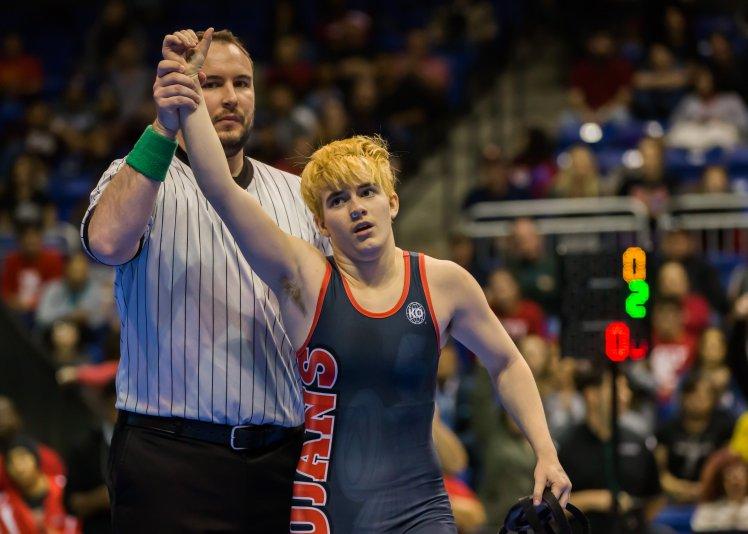High school senior Mack Beggs has two Texas state wrestling titles, a college scholarship and a potential Olympic career. What he hasn’t had is the opportunity to wrestle against other boys.
Beggs is a transgender wrestler who has been taking 36-milligram testosterone injections since he began high school. The University Interscholastic League (UIL) allows the prescription for competitive athletes because it is being administered by a medical professional for a “valid medical purpose.” This dose is low for testosterone replacement therapy, even for someone just starting to receive injections. It’s unclear what kind of effect the testosterone has on athletic ability because medical studies on the topic are rare.
Although Texas policy allows him to wrestle competitively while taking testosterone, Beggs is only allowed to compete in the girls’ division because his gender is listed as female on his original birth certificate. Beggs said he has wanted to wrestle against other boys, but that he couldn’t find a solution for his current predicament. “I can tell the State Legislature to change the policy, but I can’t tell them to change it right now,” he explained to the Dallas Morning News. He’s right. Any changes that his activism prompts will happen too late for him to take advantage of. The UIL claims to have never received a request for Beggs to switch divisions, despite clear evidence of contact between his family and the organization.
Ever since Beggs’ gender became public knowledge just over a year ago, he has been faced with outrage from his opponents, their parents and the public at large. The parents of two competitors withdrew their daughters from the 2017 UIL championship despite both wrestlers’ wishes to continue. After Beggs defeated Cypress Ranch senior Kayla Fitts at the 2018 semifinal, she said that she felt it was unfair that she had to wrestle him because his testosterone injections amounted to steroids. “The strength definitely was the difference,” she said. Fitts had a record of 52-0 for the season before losing to Beggs.
Going by the numbers, it seems Fitts might be right. Beggs is graduating with a record of 132-9, but he hasn’t lost a match in the past two years—around the same time the physical effects of the testosterone, such as facial hair, began to appear.
It seems that the natural solution would be to let Beggs wrestle with other boys. Both USA Wrestling and the International Olympic Committee have altered rules to say that transgender men are only eligible to wrestle in the men’s division. Neither organization will require documentation; the policy states that an athlete need only have “declared that his gender identity is male.” The UIL has not yet followed suit, meaning that high school wrestling tournaments do not have to conform to this policy.
However, even if the UIL were to adopt this policy, other problems are apparent. Although USA Wrestling’s policy for transgender men only requires a declaration of gender identity, the policy for transgender women has a laundry list of requirements, including medical records, regular testing of testosterone levels, consequences for irregular hormone levels and a ban on altering your gender identity for four years after declaring the change. This seems like blatant transmisogyny, but hormones are very relevant in a strength-based sport. While parents felt Beggs had an unfair advantage while competing in the girls’ division, forcing trans male wrestlers to compete in the boys’ division even if they haven’t yet begun to transition puts them at a disadvantage. Similarly, a solution based solely on gender identity would have pre-transition transgender women wrestling in the girls’ division, where they would be put at an advantage. Every potential solution, including regulations based solely on points of transition or solely on gender identity, brings up more layers of complication, such as intersex athletes or cisgender athletes who have hormone imbalances.
While in an ideal world we would be able to say that athletes should all be allowed to compete in the division that corresponds to their gender identity, the reality is that this is a complicated problem with no clear solution. For Beggs, who is graduating with an impressive record, the future is bright. He says he has never cared about public reaction, and is excited and proud to be moving forward with gender-affirming surgery and being allowed to compete in the men’s division at the collegiate level.




